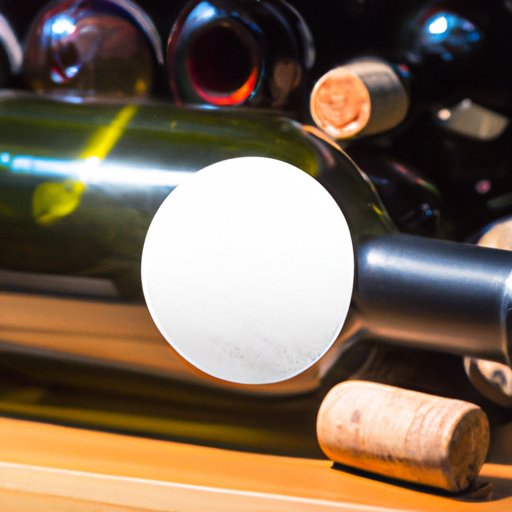
I. Introduction
Wine is a popular alcoholic beverage enjoyed by millions of people worldwide. Though often associated with sophistication and relaxation, the effects of wine can be dangerous if not consumed responsibly. In this article, we will explore the relationship between wine and intoxication, the effects of overindulgence, and how to safely enjoy a glass of wine while minimizing risks of impairment and hangover.
II. Wine and Intoxication: Can You Get Drunk on a Glass of Merlot?
Like all alcoholic beverages, wine has an intoxicating effect on the body. The amount of alcohol in a given bottle of wine can vary, with some having as much as 16% and others as little as 5%. The amount of alcohol in a glass of wine can range between 0.6 and 1.2 ounces depending on the variety, the size of the glass, and the type of wine.
Several factors influence how much wine it takes to become intoxicated, including age, weight, sex, tolerance, and whether it is consumed on an empty or full stomach. As a general rule, consuming more than three glasses within a short period can lead to intoxication.
That being said, it’s important to understand that wine is meant to be enjoyed. Drinking a glass of wine with a meal or on special occasions is perfectly safe as long as consumption is measured. The key is to be aware of how much wine you’re drinking and to understand your limits.
III. Why Wine Hangovers are the Worst: Understanding the Link between Wine Consumption and Intoxication
Wine has a reputation for causing some of the most severe hangovers among all alcoholic beverages. This is due to several factors, including the presence of congeners, which are chemical compounds produced during the fermentation process.
Congeners have been linked to headaches and nausea commonly associated with wine hangovers. Additionally, the dehydrating effect of alcohol can contribute to dehydration, leading to symptoms such as fatigue, dry mouth, and thirst.
To minimize the effects of a wine hangover, be sure to drink plenty of water between glasses, have some food at hand, and avoid high-congener wines such as red wine.
IV. The Art of Drinking Wine Responsibly: Tips for Enjoying a Glass of Wine without Going Overboard
Drinking wine in moderation and accountability is crucial to mitigating its negative effects and enjoying the benefits. When consumed in moderation, wine can have positive health benefits such as reducing stress, decreasing the risk of heart disease, and aiding digestion.
One excellent way to approach wine consumption responsibly is to pace yourself and to avoid drinking too much wine too quickly. Additionally, wine should not be consumed on an empty stomach as doing so can lead to quicker intoxication. The importance of pacing can’t be overstated, so take your time and relax.
V. Breaking down Wine’s Intoxicating Effect: Understanding How Alcohol Affects Your Body
The effects of alcohol on the body vary depending on the individuals’ weight, height, and gender. Alcohol affects the nervous system and impairs judgment, reasoning, and balance. Additionally, alcohol can lead to dehydration, nausea, headaches, and even blackouts.
Staying safe when drinking wine involves avoiding other activities that require coordination and attention, such as driving or operating heavy machinery. It’s essential to understand your limits and always drink in moderation.
VI. Wine and Safety: Things You Need to Know about Drinking Wine and Driving
Drinking and driving should never mix. Wine, like all alcoholic beverages, impairs judgment and coordination, making driving much more dangerous. Anyone who drinks wine should avoid driving or operating machinery when under the influence.
Fortunately, there are several alternatives to drinking and driving, such as using a designated driver, calling a taxi, or using a ride-sharing service. Additionally, many wine clubs and vineyards offer accommodation options, so be sure to take advantage of these alternatives when they are available.
VII. Overindulging in Wine: The Consequences of Heavy Wine Consumption
Overconsumption of wine, like any alcoholic beverage, can have long-term health consequences and increase the chances of developing liver disease, cancer, and other health problems.
Overindulgence in wine can also lead to accidents, poor decision-making, and alienation from loved ones. To prevent this, it’s important to set reasonable boundaries and ensure consumption is measured and accountable, limiting yourself to a glass or two per sitting. Additionally, when drinking, it’s crucial to stay hydrated and have food on hand.
VIII. Conclusion
Wine is a popular drink enjoyed across the world for good reason. It’s delicious, with many health benefits when consumed in moderation. Yet, like all alcoholic beverages, if consumed excessively, it can have negative consequences.
To enjoy wine responsibly, it’s crucial to understand your own limits, measure your consumption, and avoid drinking and driving. By doing so, you can enjoy the many benefits of wine, relax, and enjoy the company of your friends and family safely.





